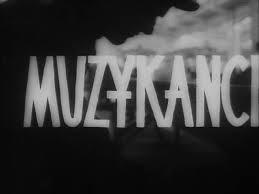The Musicians (S)

Film as poetry has been part of film since the creation of moving pictures. Prewar filmmakers had discovered the poetic power of montage techniques and had begun to explore the parallels between sight/sound associations in film and word/image association in written poetry. Explorations into the possibilities of film as poetic language intensified after WWII – not only had techniques and technology improved (particularly in sound synchronization) – but documentary filmmakers increasingly saw the power inherent in film to evoke emotions and ideas and explore the human condition. Coupled with this was an emphasis among many filmmakers on both sides of the Cold War divide that documentary film had an obligation to confront social issues. Kazimierz Karabasz, together with Jerzy Bossak, began the "ethics and aesthetics" movement in postwar Polish documentary film. Both emphasized the social importance of documentary filmmaking. While Bossak advocated a focus on details of life to suggest a greater universal condition, Karabasz stressed the aesthetic approach of the filmmaker. He espoused a theory in which the filmmaker should have minimal influence over what he films, with an absence of staging. He also emphasized choosing subjects from everyday life. The mixture of social awareness and aesthetic approach is clear in Karabasz’s short film-poem masterpiece, The Musicians. Among the most pressing social realities of postwar European and North American society was rapid industrialization and the emphasis on economic productivity. The film opens with the cacophony of a factory at work, the modern anti-symphony of noise and mechanization. At closing time, the workers head home, and the factory falls into silence. The camera follows some of them as they come together with musical instruments for an orchestral rehearsal of ensemble music. In contrast to the factory of noise and machines, Karabasz shows the humanity of the workers as amateur musicians and the pleasing harmony of the music they create together. Visually beautiful, the film clearly contrasts the dehumanization of the factory with the dignity of the workers.